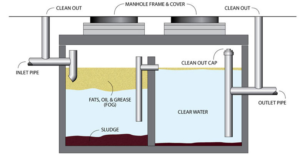Maintaining a clean commercial environment is one of the most important responsibilities for business operators. It can improve employees’ health and well-being, make a positive impression on clients, and elevate your company’s reputation.

Commercial Cleaning Services Baltimore have the expertise and equipment to provide deeper sanitization and disinfection than residential cleaners. They can also offer a wider range of services to meet specific needs.
The cleanliness of a commercial space is a key element in establishing and safeguarding a business’s reputation and long-term success. Studies show that a clean environment leads to increased foot traffic and higher customer satisfaction rates. While some businesses choose to handle commercial cleaning themselves, hiring a professional company can save money and ensure that all areas of the establishment are cleaned thoroughly.
Commercial cleaners offer a range of services that are tailored to the unique needs of each space. Generally, these are divided into two categories: regular cleaning and deep cleaning. Routine cleaning includes procedures like dusting, vacuuming, mopping, taking out the trash, and sanitizing surface touchpoints. It is typically performed daily or weekly, depending on the nature of the space.
Deep cleaning is a more involved procedure that addresses specific issues that can’t be covered with routine cleaning. These can include things like degreasing kitchen equipment, carpet extraction, and thorough disinfection of hard-to-reach spaces. These are usually conducted on a more frequent basis, but they can also be scheduled on an as-needed basis.
Maintaining a clean environment is a high priority for most businesses, but it can be difficult to do without the assistance of a professional company. Commercial cleaners specialize in a wide variety of tasks, so they can quickly and efficiently tackle all aspects of a business’s upkeep. In addition, commercial cleaners have the proper tools and equipment to do the job properly and safely.
When it comes to business cleaning, the more regularly a company is cleaned, the better. However, this isn’t always possible for companies that are busy with their day-to-day operations. It is likely more productive and makes financial sense to hire a professional commercial cleaner rather than ask employees to take on the task of cleaning the workplace during their working hours. Plus, a professional commercial cleaner will be able to get the job done quickly and efficiently even during busy periods, holidays, or staff sick days. As a result, it is a worthwhile investment to make. In the end, it will save time, money, and help protect the health and safety of employees and customers alike.
Deep Cleaning and Disinfection Services
Commercial cleaning services have the experience, equipment and chemicals to clean larger facilities. They also have a team of cleaners that are ready to step up when needed. This allows them to provide additional services such as deep cleaning and disinfection during high-risk periods. These extra services can be particularly beneficial during COVID-19 pandemics and other health emergencies.
Regular commercial cleaning services include sanitizing and disinfecting all surfaces, fixtures and furnishings in a commercial space. This includes high-touch areas like counters, phones, keyboards and desks. It also includes kitchen and bathroom surfaces as well as floor care. The cleaners use EPA-approved disinfectants and follow Centers for Disease Control guidelines to ensure a healthy environment for employees and customers.
Many commercial cleaning companies also offer specialized carpet and upholstery cleaning services. This is because these spaces are prone to heavy foot traffic and other factors that can cause the materials to degrade over time. These professional cleaners will use specialized machinery to get the job done right. They can extract dirt from deep within the fabrics and help extend their lifespan.
Another service offered by many commercial cleaning services is trash removal. This is important because it prevents the accumulation of hazardous waste in the workspace. It also helps businesses comply with local regulations and ensures that all recyclable material is disposed of properly.
The cleaning services offered by commercial cleaning companies are also more efficient than the work that can be performed by in-house staff. This is because they are able to take on a large volume of work quickly and efficiently. They are also able to work around your business schedule so that you do not have to worry about interrupted workflow or lost productivity.
A clean workplace is not only good for your customers but it is great for your company’s reputation as well. Today’s customers want to know that the business they are dealing with is responsible and takes its surroundings seriously. By hiring a reliable cleaning service, you can convey this message to your customer base and make sure that they return in the future.
Customized Cleaning Solutions
Commercial cleaning services offer a wide range of customized cleaning solutions, which can include anything from floor treatments and shampooing carpets to window washing and graffiti removal. Their goal is to help you keep your place of business clean and looking good, which in turn will boost customer satisfaction and staff morale.
A clean environment is a necessity for every type of business. A sanitary office will reduce the risk of illnesses and infections among employees, while an attractive showroom or storefront will increase sales and promote brand credibility. Commercial cleaning services will handle all your business’s cleaning and maintenance needs, including trash disposal, dusting and vacuuming, sanitizing shared equipment and common surfaces like doorknobs and light switches, cleaning and disinfecting restrooms, cleaning and polishing glass, and sweeping and mopping floors.
Most companies offering commercial cleaning services also offer a wide variety of specialized cleaning solutions, such as deep carpet cleaning that removes embedded dirt and allergens; power washing sidewalks, parking lots, and building exteriors to eliminate stubborn grime and mold; and detailed cleaning of hard flooring surfaces, including stripping and waxing vinyl and linoleum, buffing and burnishing tile, and deep cleaning hardwood. These services are often a bit more extensive than standard janitorial duties, but they are necessary to maintain a high level of cleanliness.
Investing in a commercial cleaning service will help you save money on regular maintenance, as well as free up your in-house staff to focus on their professional duties and tasks. Your business isn’t a home, and it doesn’t make financial or practical sense to ask your employees to take on additional cleaning responsibilities.
If you’re interested in finding a company that provides comprehensive and cost-effective commercial cleaning in NYC, check out their reviews to find out how satisfied previous clients have been with their work. Then, sit down with the company to discuss your cleaning requirements and schedule. A reliable commercial cleaner will come to your business on a scheduled basis and perform the cleaning tasks you need, regardless of whether they are a regular or one-off job.
Maintain a Healthy Environment
If you work with a professional cleaning service, they will ensure that high-touch areas such as doorknobs, light switches, and computer keyboards are regularly sanitized. These areas are often overlooked in a regular cleaning routine but can harbor significant amounts of germs and bacteria that can be passed from one person to another. With antimicrobial spraying services, commercial cleaners will disinfect these areas and help to prevent the spread of illness.
Regular cleaning also helps to reduce allergens in the workplace, which can improve employee health and increase productivity. This is because dust, mold, and other allergens can trigger asthmatic reactions and contribute to sick days. Professional cleaners will take out trash, clean floors, sanitize bathrooms and eating spaces, and perform other types of light cleaning on a regular basis.
A clean environment sends a message to clients, customers, and employees that a business cares about its appearance and is committed to providing a quality experience. This perception can build customer trust and lead to more sales opportunities. Commercial cleaning companies can help businesses maintain a clean, well-maintained space that conveys a positive image and enhances the overall reputation of the company.
Hiring a commercial cleaning company can save a business money in the long run by reducing expenses and improving efficiency. A professional cleaning service can offer a wide range of services to meet the needs of any business. Additionally, they can provide ongoing maintenance and support to keep the space in pristine condition at all times.
A clean environment is vital for businesses, whether they are a storefront, office building, or restaurant. It can increase employee morale, contribute to a healthy work environment, and help to attract and retain customers. However, maintaining a clean environment is not an easy task and can be time-consuming and expensive. A professional cleaning company can help businesses maintain a clean and healthy environment that is essential for success. Choosing the right company will ensure that all aspects of the business are properly cleaned and maintained, which can help to improve the bottom line and protect the company’s reputation.
